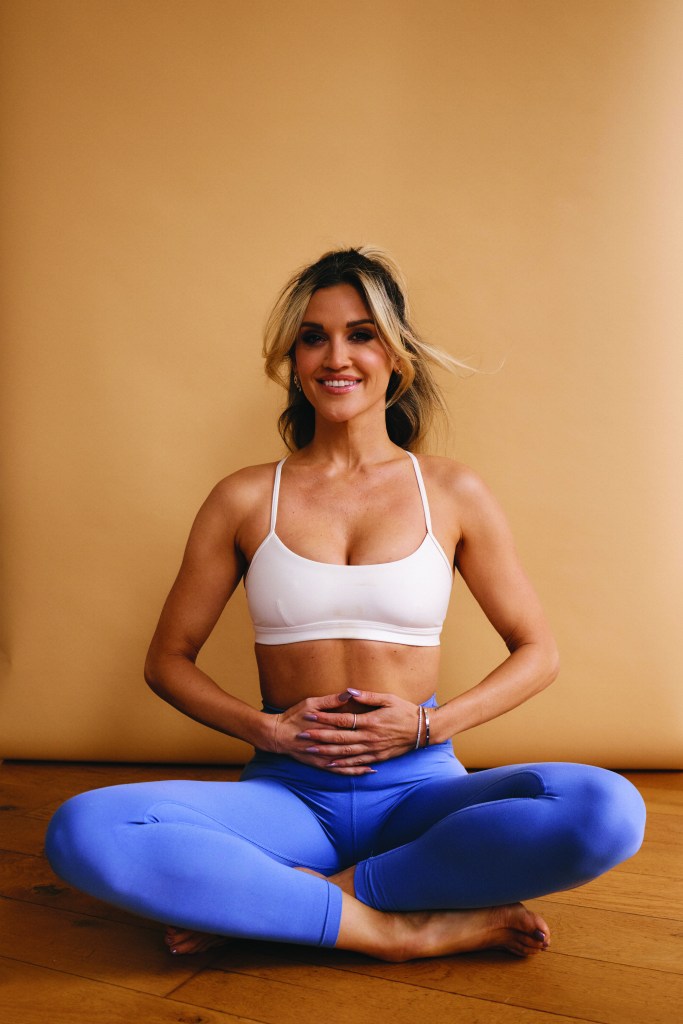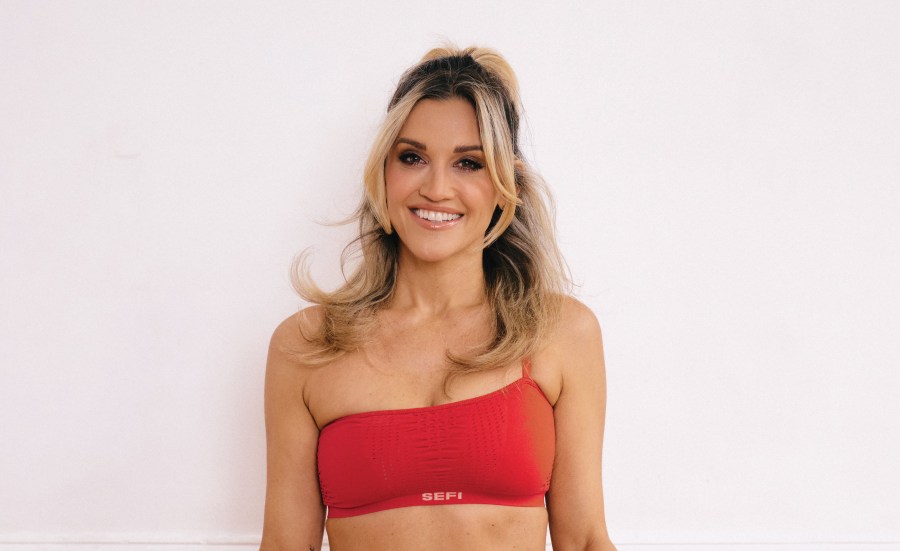After struggling with extreme restlessness, anxiety and terrible sleep for years, multi-talented presenter and performer Ashley Roberts turned to breathwork to transform her mental, emotional and physical wellbeing…
Words: Joanna Ebsworth | Photography: Sofi Adams
‘I think the human experience is tough. Nobody gets out unscathed, and we’ve all got to go through some form of unfortunate loss, whether that’s the breakup of a relationship, losing a job or actually losing someone physically from the world. So, thank God I had dancing growing up. It was my best friend, my passion and my outlet to express myself. And then it became my career.
‘It certainly isn’t the case that I’ve always been super confident. A lot of the time, I have this ongoing anxious layer that’s always bubbling under the surface, and dancing helps so much with releasing tension and the storage of trauma in the body. Unfortunately, when I got out of [The Pussycat] Dolls, I wasn’t dancing five days a week, and I found that all the confidence, connection, identity and joy I got from dancing slipped away. I got to the point where I was like, ‘Well, now what do I do with all this restlessness and anxiousness?’
‘I was feeling all of this pain and hurt and sadness within my body. To the outside world, I probably looked like I was functioning and moving from
A to B. But internally – when I was home or by myself and I could take a moment – I was walking around like a jack in the box, all coiled up and ready to spring. My stress and anxiety levels were so high, it was taking over my whole body, and I almost felt like I couldn’t move. But dancing was so wrapped up in a chapter that I was ready to put behind me, I knew there had to be a major change in my life. That’s when I decided to go on a search of discovery and find what else could light me up and make me feel good without being in the form of a prescription or pill.
‘I was living in Notting Hill 10 years ago, and I was feeling a bit lost and lonely. So, I started seeking some sort of adventure that also would have some life tools wrapped up in it. I found this retreat in Bali and went on my own, really excited to meet this spiritual thinker called Mastin Kipp. But I don’t actually remember much of what he said: all I remember is feeling this sense of peace after doing these Kundalini yoga breathwork classes. I knew I wanted more, so I started seeking out breathwork classes, whether I was in Los Angeles, New York or London.

‘Breathwork became something I enjoyed doing sporadically. But about four or five years ago, I had a whole raft of bloodwork done and found out from a doctor that my body was in quite a stressful state. When she said that performing actually stresses my body out even more, I was like, ‘What? Wait a minute! I’ve been doing this my whole life!’ She then practically prescribed breathwork to me to help balance out my nervous system, and that’s when I began to take it more seriously, doing it several times a week, going on retreats, and doing 200-hour courses.
‘For over a year, I’ve been doing at least two 90-minute breathwork classes a week. I do them because I love breathwork so much, and sometimes, I’ll spend 45 minutes to an hour just sitting by myself on my mat at home while setting my intention for the day. I’ve got a little ritual in the morning that I stick to, where I put my feet on the ground and I always say, ‘today’s going to be a good day’. Even if I don’t feel it, and it’s dark and miserable outside, I tell myself that, take a few deep breaths, and then I’m like, ‘all right, let’s go’.
‘It’s so important to give yourself permission to take some time for yourself. Because life is a lot with technology and social media and the news, especially if you get straight on your phone first thing. But even taking just five minutes to have a little routine for yourself in the morning or at bedtime can make big difference. I’ve suffered from bad sleep since I was a teenager, so it’s something that I’ve dealt with for many, many years, and
I still do. But now I’ve got these tools and a bedtime ritual, I’ve been able to have a better relationship with sleep, and I can handle stressful situations much better.
‘For me, breathwork has been an absolute game-changer. It’s changed my life in such a positive way, and that’s why I wanted to write my book, Breathwork: Techniques for Better Mental, Emotional and Physical Health (Leap, £20). I’m not a guru, but I am passionate about helping others,
and I have learned about the science behind breathwork and the way it can change your state of being.Breathwork has been around for many, many years, studied and practised in different cultures, which is why it’s crazy to me to think that this is not something we are taught when we’re growing up.
‘For me, breathwork has been an absolute game-changer. It’s changed my life in such a positive way’
‘Every breath we take sends a signal to our body. Unfortunately, we’re mostly walking around shallow breathing, so we’re telling our bodies we are in a stressed state before we even encounter the daily stresses life throws at us. But we can help ourselves just by being more conscious of how we’re breathing. Breathwork helps you to activate the parasympathetic part of your nervous system, which is the part that helps you to feel safe and relaxed. And from that state of being, you create your own endorphins naturally, so you feel more joyful and creative.
‘Breathwork also gets me out of the chaos of my monkey mind. It helps me to come back into my heart space, so I can feel calmer and more connected to the place where I feel like I’m ‘home’. Without all of the noise, I feel I can do anything. And the more you start to believe that, the more you can create that state within yourself and shift the reality you’re walking through life in. Because how we show up for our life is how we’re going to experience it. It’s like going to the gym and doing squats. The more you go back and do the exercises, the more you start to see the gains.
‘It only takes two or three minutes of breathwork a day to show up for yourself. And if you can do that for a few weeks, there’s no way you won’t start to feel a difference. Taking a moment to pause can even help to deal with the pressure that comes with the festive season. There’s often a lot of family dynamics going on, and I think that can stir up a lot of emotion that people bury under the presents and the tinsel. Christmas can be a lot for many people, so it’s super important to look after yourself. I spend time with my family, and I love them, but even I have to step away for five minutes sometimes and take some deep breaths, so I can then go back out and continue to enjoy the festivities.
The 4-7-8 breath
‘This technique is also known as the Brain Tranquillizer, and it’s a simple exercise that’s good for everyone, including those unfamiliar with yoga or meditation. What we know is if we increase the length of our exhale in relation to our inhale, we send the brain a message that we are safe and out of danger. This exercise aims to maximise the impact of that message.’
- Simply inhale for the count of four
- Hold that breath in for seven counts
- Then exhale it all out for eight counts
- Now, slowly and deeply breathe in again, through your nose, for another four counts to begin the cycle all over again. Try to pass the two-plus minute mark for immediate results, including a reduction in blood pressure.
Hum like a hun
‘One of the simplest ways to get your vagus nerve going is with a hum. This is because when you hum, you tend to extend your exhale. On top of that, when you create vibration in the throat, vocal chords and nose, you also increase the release of nitric oxide within the body to increase circulation, expand blood vessels and open up the airways’.
Take a deep breath in for around four counts
Then simply hum on one note, extending it for as long as you can. Intoning an actual sound makes us go longer than we do when simply exhaling the breath, and that is what is so useful here. Alternatively, hum your favourite festive tune to help align your nervous system!
Breathwork: Techniques for better mental, emotional and physical health by Ashley Roberts is out now (Leap, HB, £20)








